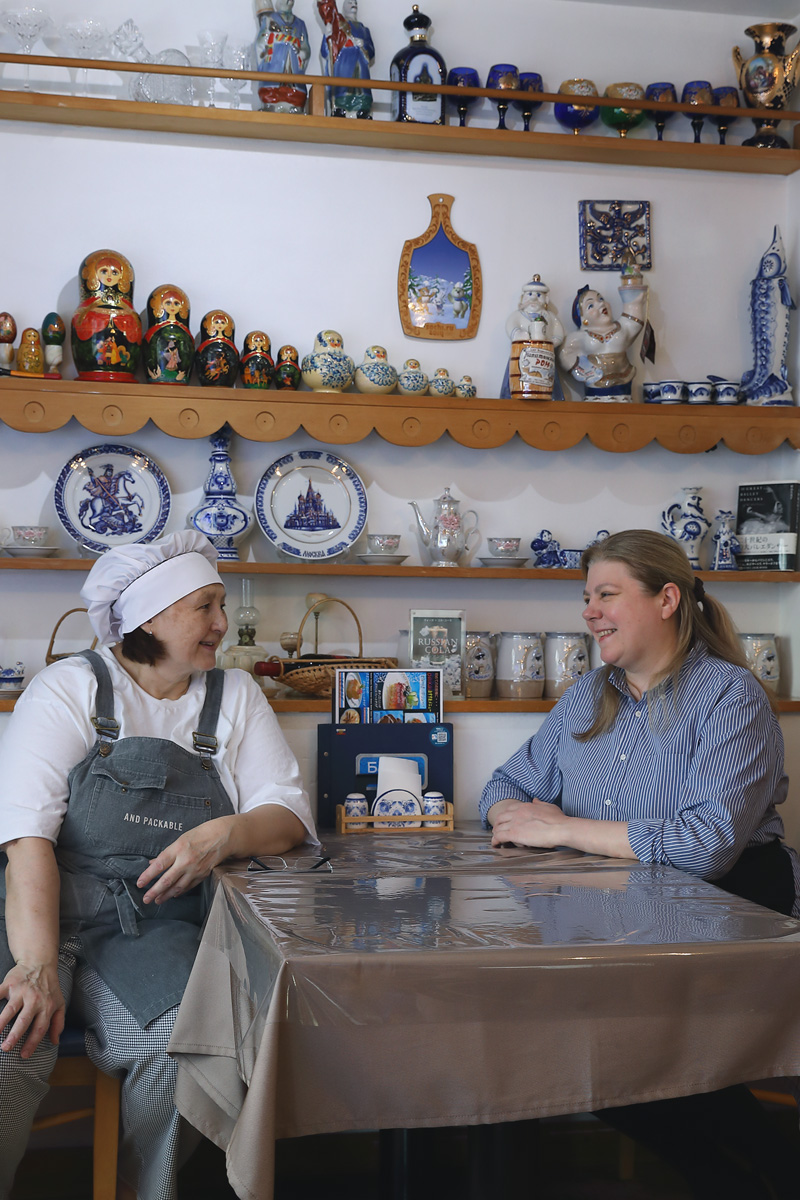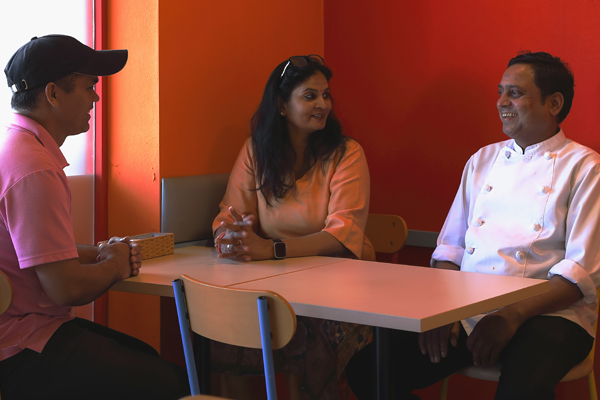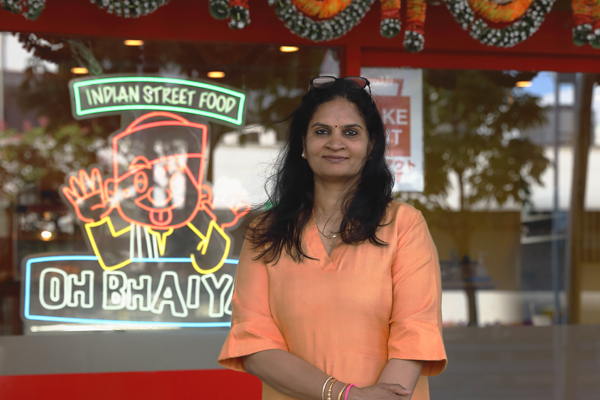チャーミングなお店で本場を味わう。ロシア料理の「六本木バイカル」。
Feature | 2025.6.24


[ ロシアンレストラン 六本木バイカル ]
レシピも食材も料理人もロシアにこだわって。
故郷の味を楽しみに人が集まる。
ロシアンレストラン 六本木バイカル
東京都港区六本木4-12-7 R.B.ビル3F
tel.03-5770-7742
六本木ミッドタウンの並び、外苑東通り沿いというメジャーなロケーションにあるロシア料理レストラン「六本木バイカル」。場所柄、敷居の高い店かと思っていたら、なんのことはなくとてもフレンドリー。
民芸品が並ぶ店内は素朴な雰囲気で、可愛いロシアが表現されている。ほっとしたこちらの気分をさらに和らげてくれるのが、店のマネージャーであるエレナ・エロステンコさんの笑顔。「私は独学で日本語を覚えました、だからあまり難しい話はできません(笑)」。
どうして六本木を選んだのですか?「このあたりのクラブにはロシア人たちが多く働いていて、ロシア大使館も近くにあります。そういった人たちのために、そしてもちろん日本人たちにも、本場のロシア料理を楽しんでもらうために2002年6月にオープンしました」。
この店の料理は日本人向けにアレンジされたものではない。「他のロシア料理店も、もちろんロシアのレシピを使っていると思います。でも、作っているのは日本人やアジア系の人たちが多い。料理とは不思議なもので、レシピどおりに作っても味は完成しません。作る人のセンスが大切で、それはロシアに生まれ育った人にはかないません」。
「六本木バイカル」は、本物のロシアの味を再現している。「シェフのジャネッタはずっとロシアで料理人をしていたので味は間違いありません。ロシアでは料理において伝統が尊重されます。店では、ずっと人々に愛されてきた、ロシアの家庭で親しまれているレシピを使っています。」
こういったロシア料理へのこだわりが多くの人を呼ぶ。「以前はロシア周辺国の人たちも来ていました。2011年の東日本大震災のときは、家に帰れなくなったロシア人をはじめ、ウズベキスタン人、グルジア(ジョージア)人、ベラルーシ人、ウクライナ人が10人以上、避難してきました。大丈夫だと言い合いながら一晩を過ごし、店からも食事やお酒を出してみんなを元気づけました。国を超えて一緒になって励まし合った、想い出に残る夜でした」。震災後は多くの外国人が日本から離れるなどで寂しくなったという。
とはいっても、今でもいろいろな人が来る。モンゴルやジョージアの方もお客さんだ。「たくさんの料理を食べて、みんな楽しく過ごします。盛り上がってきたらロシアの歌を唄います。よく唄われるのは『モスクワ郊外の夕べ』。故郷を想って、ノスタルジックな気分になります」。
今、ロシアに対していいイメージをもたない人もいる。「ロシア人は、本当は心が広く、優しい。もちろんそうではない人もいますが、多くはいい人。でも、つくり笑いができません」。愛想笑いが苦手なロシア人は、だから少し強面の印象があるのかも知れない。
エレナさんはハバロフスク生まれ。日本からも近い、アムール川がゆったりと流れる場所。古いロシアの面影が今も残る街で育ったエレナさんが店の詩をつくった。〜ネオンが灯る東京の空の下、一年中、寿司とラーメンが人気の街に、「バイカル」―ロシアが息づく小さな場所。ボルシチの香りが、ぬくもりを語りかける〜。ボルシチだけじゃなく、人のぬくもりもたくさん語りかけてくる、そんな店にロシアの人たちがやって来る。
Authentic Flavors in a Charming Setting—
Roppongi Baikal,
a Russian Restaurant Devoted to the Real Thing.
With Russian recipes, ingredients, and chefs,
it’s a place where people come for a taste of home.
Located in a prime location near Roppongi Midtown on Gaien-Higashi-dori, Roppongi Baikal may seem upscale, but it’s warm and welcoming.
The folk art–adorned interior evokes a cozy “little Russia,” and manager Elena Erostenko’s friendly smile puts guests at ease. “I taught myself Japanese, so I can’t handle complex conversations,” she laughs.
Why Roppongi? “Many Russians work at nearby clubs, and the Russian embassy is close. We opened in 2002 to serve authentic Russian cuisine—not just to Russians, but to Japanese guests too.”
The food here is not adjusted for Japanese tastes. “Other places may use real recipes, but often the chefs aren’t Russian. Cooking isn’t just about recipes—it’s about instinct, something only someone raised in Russia truly has.”
Roppongi Baikal offers true Russian flavor. “Our chef Janetta cooked professionally in Russia for years—her dishes are authentic. Russian cuisine values tradition, and we use home-style recipes passed down through generations.”
That commitment to authenticity draws a diverse crowd. During the 2011 earthquake, over ten people—Russians, Uzbeks, Georgians, Belarusians, Ukrainians—sheltered here. We supported each other through the night with food, drink, and words of comfort. I’ll never forget that night—we were united across borders.” Many foreigners left Japan after the quake, though, and things became quieter.
Still, a mix of people continue to come—Mongolians and Georgians among them. “They eat heartily and have fun. When the mood lifts, we sing Russian songs like ‘Evenings Near Moscow.’ It brings back memories of home.”
Some people today see Russia in a negative light. “But Russians are warm and kind. Of course, not everyone—but most are. We just aren’t good at fake smiles,” she says, noting that this may make them seem stern at first.
Elena was born in Khabarovsk, not far from Japan, on the wide-flowing Amur River. Raised in a city rich with old Russian charm, she even wrote a poem for her restaurant:“Beneath Tokyo’s neon sky,in a city of sushi and ramen,‘Baikal’—a little place where Russia breathes. The scent of borscht warms our hearts.” It’s not just the borscht—it’s the human warmth that keeps Russians coming back.




閲覧中の特集はこちら





